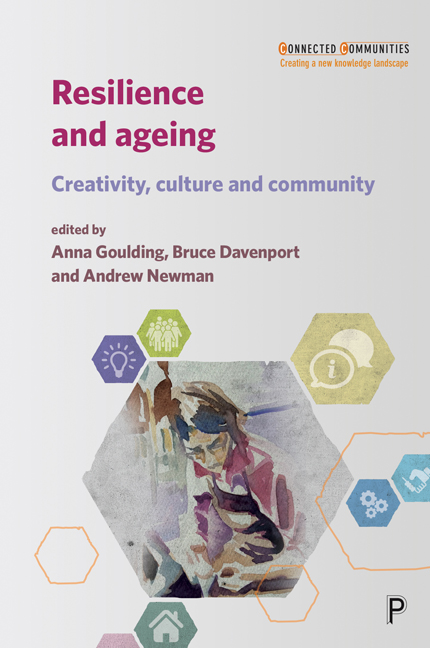Book contents
- Frontmatter
- Contents
- List of figures, tables and boxes
- Notes on contributors
- Series editors’ foreword
- Introduction
- one Setting the field: older people’s conceptualisation of resilience and its relationship to cultural engagement
- two Ages and Stages: creative participatory research with older people
- three Social connectivity and creative approaches to dementia care: the case of a poetry intervention
- four Narrative identity and resilience for people in later life with dementia living in care homes: the role of visual arts enrichment activities
- five After the earthquake: narratives of resilience, re-signification of fear and revitalisation of local identities in rural communities of Paredones, Chile
- six Integrating sense of place within new housing developments: a community-based participatory research approach
- seven Ageing in place: creativity and resilience in neighbourhoods
- eight Crafting resilience for later life
- nine Oral histories and lacemaking as strategies for resilience in women’s craft groups
- ten Objects of loss: resilience, continuity and learning in material culture relationships
- eleven Later-life gardening in a retirement community: sites of identity, resilience and creativity
- Index
seven - Ageing in place: creativity and resilience in neighbourhoods
Published online by Cambridge University Press: 19 April 2022
- Frontmatter
- Contents
- List of figures, tables and boxes
- Notes on contributors
- Series editors’ foreword
- Introduction
- one Setting the field: older people’s conceptualisation of resilience and its relationship to cultural engagement
- two Ages and Stages: creative participatory research with older people
- three Social connectivity and creative approaches to dementia care: the case of a poetry intervention
- four Narrative identity and resilience for people in later life with dementia living in care homes: the role of visual arts enrichment activities
- five After the earthquake: narratives of resilience, re-signification of fear and revitalisation of local identities in rural communities of Paredones, Chile
- six Integrating sense of place within new housing developments: a community-based participatory research approach
- seven Ageing in place: creativity and resilience in neighbourhoods
- eight Crafting resilience for later life
- nine Oral histories and lacemaking as strategies for resilience in women’s craft groups
- ten Objects of loss: resilience, continuity and learning in material culture relationships
- eleven Later-life gardening in a retirement community: sites of identity, resilience and creativity
- Index
Summary
Editorial introduction
In common with the first two chapters of this book, this chapter takes a creative, participatory approach to exploring older people's experiences of resilience in their neighbourhoods. In this case, the authors used a ‘World Café’ approach to eliciting responses and generating consensus and, at the same time, used creative methods both to support participation and to communicate the findings to a wider audience. As such, this chapter has much in common with Chapters Five and Six, in so far as the researchers are explicitly concerned with helping participants to become aware of the resources they have to support resilience (which is seen as social) and to become engaged in wider social and political processes that impact on their resilience.
Introduction
How do we age in place? How, in the UK, do we grow older in our communities and find support in these times of austerity? The UK central government presents the hollowing out of the state as an inevitable consequence of globally created and nationally experienced austerity (Phillipson, 2012). The impact, however, is that the risk of exclusion arising from public sector withdrawal is disproportionately weighted towards groups who are vulnerable through individual or social and community factors. As we detail in the next section, support for adult care is now severely reduced, while neighbourhood institutions of community centres and libraries providing structured activity have also been thinned. Between 2010 and spring 2016 an estimated 343 libraries have been closed, including 132 mobile services targeted at housebound readers (Woodhouse and Dempsey, 2016). Two thousand bus routes were altered or withdrawn between 2010 and 2015 (Campaign for Better Transport, 2015); while 2,500 bank branch closures are expected by 2018 (Edwards, 2015). These lead to a loss of local services and, importantly, a loss of meeting places for social interaction.
This chapter reports on the findings of an arts-based participatory consultation with older people living in the English north-east city of Newcastle upon Tyne. In 2014–15 and over a period of eight months we shared conversations about what people do to support themselves and others and what else they need to enjoy a ‘good later life’, living at home, being part of a place and neighbourhood.
- Type
- Chapter
- Information
- Resilience and AgeingCreativity, Culture and Community, pp. 157 - 180Publisher: Bristol University PressPrint publication year: 2018



